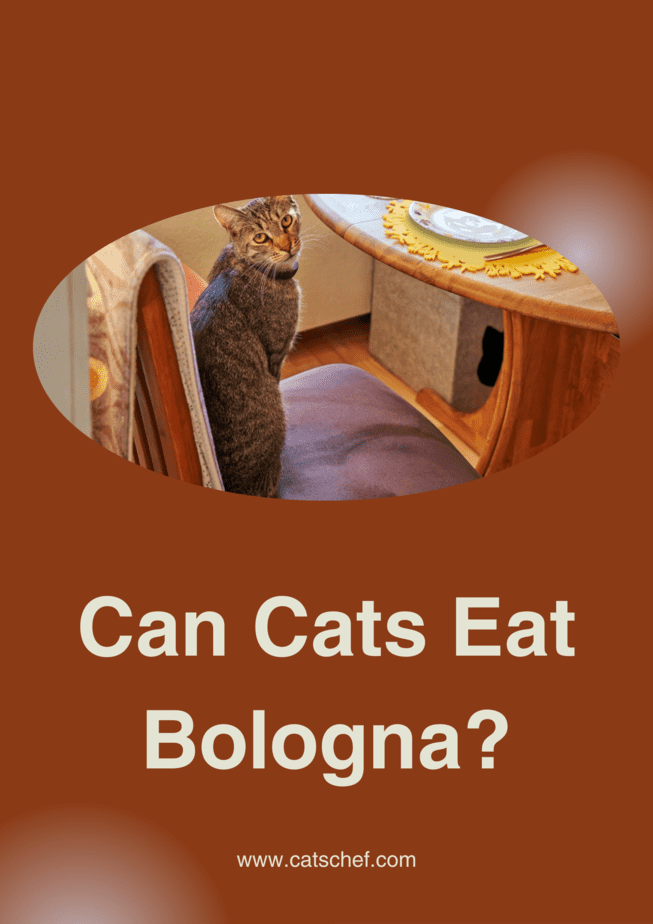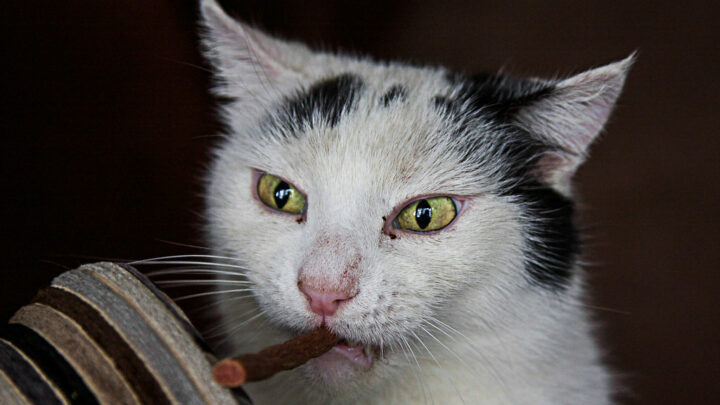Cats are known to adore meat, but can they eat every kind of meat that comes their way? For example, can cats eat bologna? What’s to stop your feline companion from enjoying this delicacy?
The human urge to share carries over into sharing meals with our adoring pets. We’re all guilty of this, but sharing isn’t always just a nice deed. We may have the best of intentions when we give our furbaby a slice of bologna, but is it that simple?
Just because she eats the slice you shared, it doesn’t mean it’s good for her. If you’re looking to bribe your pet with some food, you should always ask yourself if it’s okay for her to eat that.
Do cats like bologna?
This is probably a question we can all assume the answer to. Bologna is one of those foods that will make your furball’s whiskers dance. Cats are usually crazy about bologna because of the large quantity of fat it contains.
However, some kittens may turn their heads away from it because of the spices and odors contained within. Regardless, you shouldn’t give this treat to your cat. It has a little nutritional benefit for your fluff and will very likely harm her.
It should go without saying that high salt content, as well as artificial tastes and chemicals, are harmful to your pet. These can cause serious medical issues, so just because they like it, it doesn’t mean cats can eat bologna.
Is bologna safe for your cat?
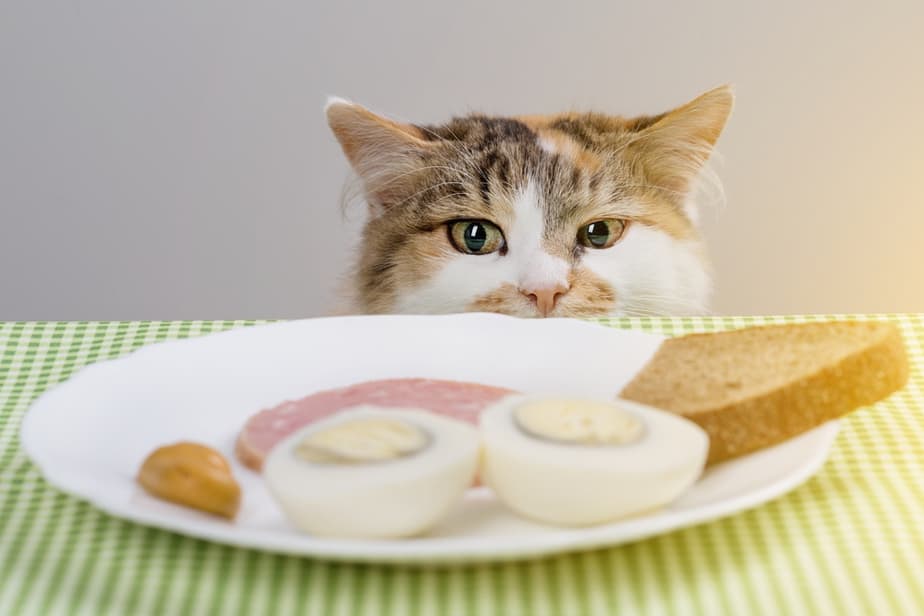
When it comes to bologna, humans may not give much thought to their health. This human delicacy isn’t the healthiest option for people, let alone cats.
Small quantities of bologna are unlikely to cause immediate harm to your cat. However, felines shouldn’t consume this meat on a regular basis.
Bologna is made from a combination of mostly red meats, such as pork and beef. The sausage meat is cooked and smoked through a thorough preparation process.
Some countries may incorporate chicken and turkey in the mix. Hence, bologna is a popular store-bought delicacy and a menu staple in many households.
We understand why you think it’s okay for cats since they’re carnivores. However, bologna, like Vienna sausage, isn’t the healthiest option for your cat because of the additional herbs and spices.
It’s unlikely to harm your cat if consumed in moderation. But for the sake of your sanity and your cat’s health, you might want to stick to cat-appropriate snacks.
Can cats eat bologna?
Cats must consume meat to thrive since they are obligate carnivores. You’d think that hams are a great source of animal protein that cats need on a daily basis. Sorry to burst your bubble here, but you were deceived.
Unfortunately, the protein content of this processed meat is insufficient to fulfill the nutritional needs of your feline friend. She would benefit much more from cooked meat with no spices.
The answer to the question of whether cats can eat bologna is, unfortunately, a negative one. And here, we’ll see why and how is this meaty treat unhealthy for felines.
Bologna is made up of a variety of meats, which you may assume would be ideal for a carnivore like your pet. This isn’t the case, though. The flesh in these sausages is thoroughly processed, with just a minimal quantity of useful nutrients remaining.
That being said, bologna doesn’t provide the nutrition that cats require. By the time the process is complete, most of the protein has been denatured. This tasty treat has little nutritional value and includes substances that are harmful to your cat.
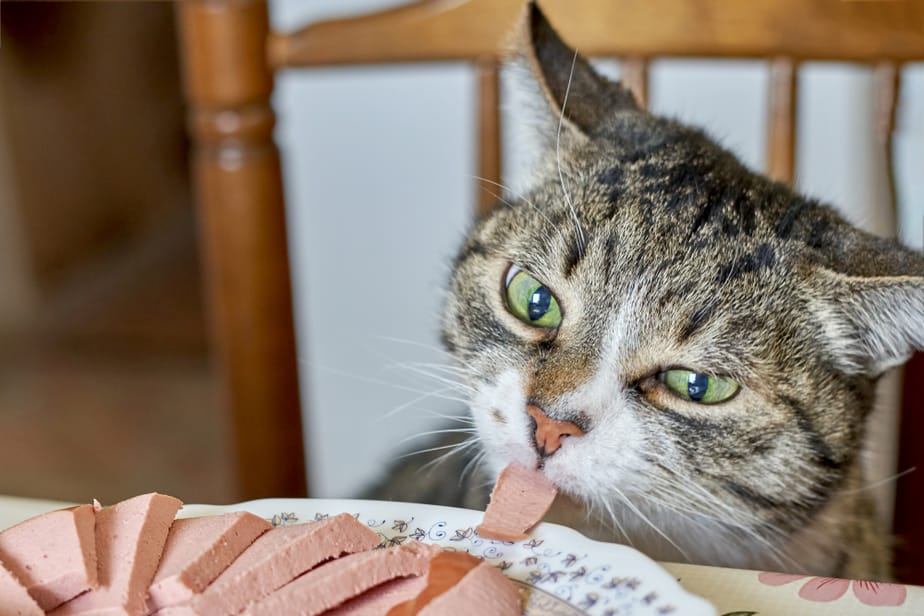
But it has meat!
It’s true, bologna is made up of meat. That would be purrfect if it weren’t for other harmful ingredients contained in this meat.
Beef bologna is a good protein source for cats, but don’t forget about the quantity of fat it contains. The meat in bologna is heavily processed.
To retain the meat’s color and fresh appearance, a variety of artificial chemicals are used, one of which is salt. These undercut the health benefits beef alone brings to cats.
Next to beef, poultry is the next most consumed meat. Its frequent appearance on our menu is due to its quick manufacture and simple processing. Aside from that, chicken is a high-protein food.
Animal protein is essential for cats’ survival, and the good news is that chicken has plenty of it! It also has a minimal fat and salt content. This is excellent news because you don’t want your fluff to get overweight. It also contains minerals and vitamins that are beneficial to your feline.
Unfortunately, bologna, whether it’s made from beef or poultry, undergoes the same process that destroys important nutrients. The same goes for other types of bologna, so there’s not much your pet can gain from this treat!
1. Unhealthy fats
Because of the high-fat content, you’re undoubtedly wondering “can cats eat bologna?”. Unfortunately, the lipids in this meat are mostly saturated fats, which aren’t the healthiest choice for your cat. This kind of dietary fat has been linked to high cholesterol levels.
Heart disease and stroke can be caused by high cholesterol levels in your pet’s blood. Some of the symptoms of this ailment include fatigue, shortness of breath, and nausea.
Bologna consumption on a regular basis may cause other health issues, too. Your cat may get clogged arteries in addition to being overweight. Moderate consumption shouldn’t be an issue, but excessive quantities should definitely be avoided.
Apart from the high-fat content, you should be concerned about the number of calories found in bologna. This calorie-dense snack isn’t the best choice if you’re trying to keep your cat’s weight under control.
This wouldn’t be a problem if it weren’t for the added pressure on her joints. Overweight cats have a harder time jumping, climbing, running, and playing.
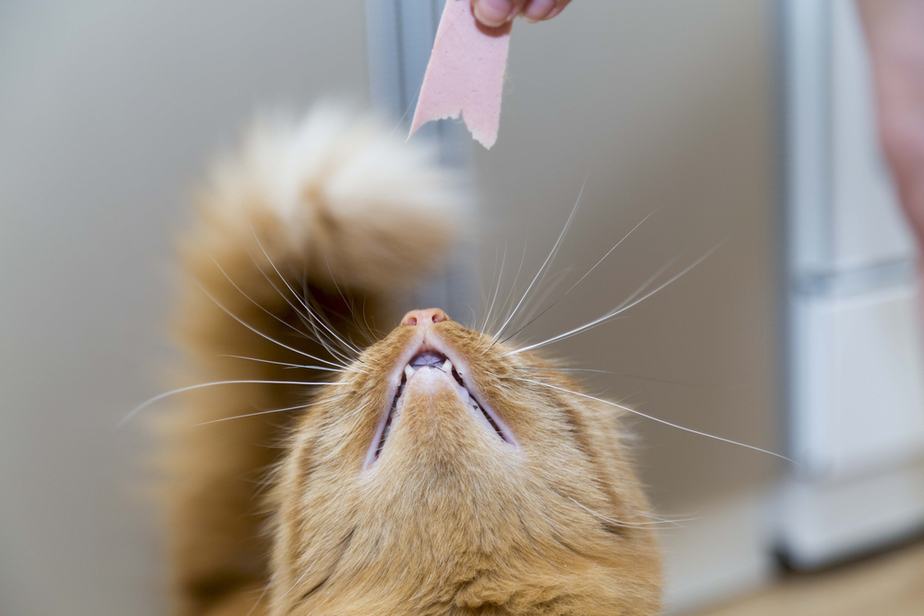
2. Sodium and spices
Bologna contains a significant quantity of sodium, or salt, as we all know it. This is dangerous for your cat since it may cause sodium poisoning. Vomiting, diarrhea, and, in severe cases, tremors and convulsions are among the symptoms, and these can vary from moderate to life-threatening.
Keep this in mind the next time you want to serve bologna to your pet. Also, know that spices should also be avoided by your cat. They can cause your cat to exhibit symptoms that are similar to sodium poisoning.
Spices found in bologna, such as black pepper, are often used to stifle your cat’s curiosity since a strong odor will cause her to flee. They have more sensitive scent receptors than we do; therefore, meals that appeal to us won’t be as enticing to them.
In tiny dosages, black pepper hasn’t been shown to be harmful to cats, but bigger doses are a cause for concern. Although it’s not recommended, felines can ingest modest amounts of black pepper.
When it comes to garlic and onion powder, though, these are major no-nos. Garlic is extremely poisonous to cats. They can be killed by even a tiny amount of it, regardless of whether it’s raw, dry, or powdered.
Garlic and onions are equally hazardous to your pet if consumed or breathed in. Garlic poisoning can include nausea, vomiting, diarrhea, and breathing difficulties. You should also avoid other members of the Allium family, such as leeks and chives.
Among other spices found in bologna, we have paprika which is also dangerous for your kitty cat since it contains capsaicin, a spicy, toxic compound. Other than that, cats can’t eat bologna because of myrtle berry, another spice that’s poisonous to felines.
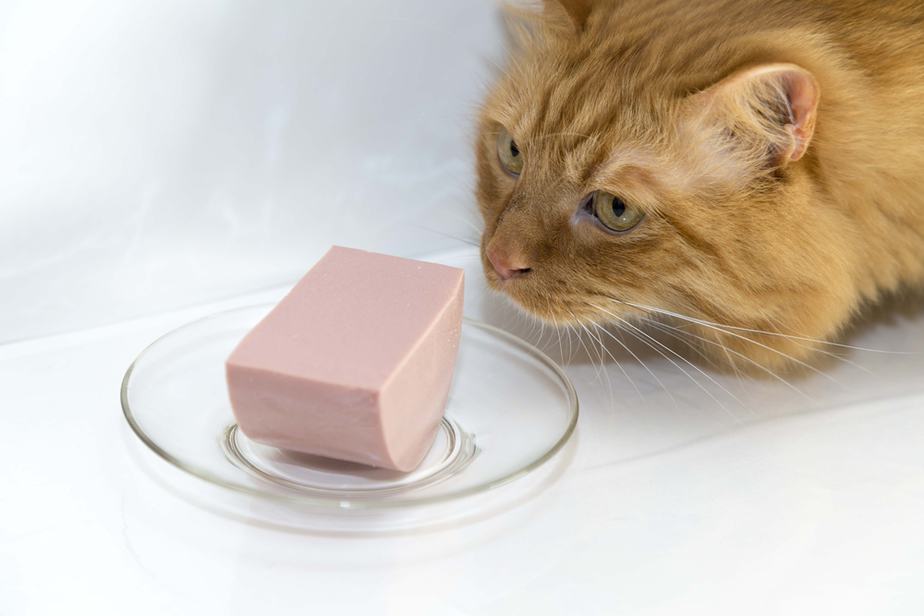
3. Preservatives
Sulfites are preservatives that prevent browning and discoloration in foods and beverages during preparation, storage, and delivery. To put it another way, they’re included to extend the product’s shelf life.
To improve the flavor and texture, bologna is packed with preservatives. These are not good for cats in any manner, so if you must feed them bologna, make sure you give them as little as possible.
Food additives like polyphosphates also extend the shelf life of these sausages. These are additives that can be found in most processed foods, and they act as stabilizers or emulsifiers.
Potassium chloride is another stabilizer. It provides taste while keeping salt levels low. When it comes to cats, though, any form of salt is harmful to their health.
4. Can cats eat bologna because of sugar?
Sugar is added to processed meat to balance out the excessive salt level of meat. It’s unlikely to cause harm to your cat in little doses. However, any excess sugar consumption might have a negative impact on her health.
Corn syrup is another taste enhancer. It aids in the binding of the meat in the creation of cured sausages like liverwurst. It adds flavor to the dish and permits the meat to maintain its color for a longer period of time.
Dextrose is another sugar derived from corn or wheat; it can also be found in other processed meats like beef jerky. This artificial sweetener might cause your cat’s blood sugar levels to rise.
Sugar is hazardous for your pet’s health in general. It’s a kind of carbohydrate with no real nutritional benefit for cats. Your cat won’t gain anything from any form of sugar and her health may suffer as a result.
Sugar intake can contribute to dental issues such as tooth decay in the long run. Obesity in cats is also a possibility, which may wreak havoc on their joints. It’s not unusual for cats to get diabetes, just like their two-legged counterparts.
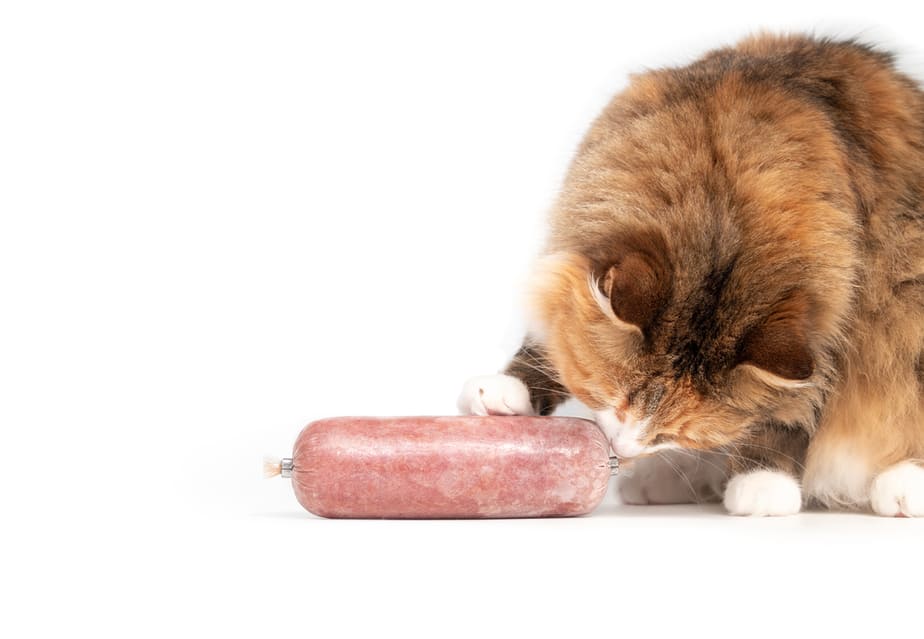
Alternatives to bologna
After reading this, you might want to keep processed meats for yourself. Give your feline companion some freshly cooked meat like beef or chicken.
Store-bought, processed meats contain seasonings and spices that are harmful to your cat’s health, so you may want to look at some alternatives.
For example, mackerel is a great treat for your cat. Fish is a cat’s favorite, and it’s also good for their health. It’s high in vitamins, which aid their immune system. However, relying solely on fish to augment your cat’s diet is not a good idea.
Cats require a well-balanced diet, which may be provided in high-quality cat food. They are, after all, picky eaters who aren’t hesitant to voice their opinions. Your cat will tell you what she likes and what she doesn’t like.
However, bologna doesn’t fit into a feline’s diet. Thanks to high demands and the ever-developing market, you shouldn’t have too much trouble finding a healthy replacement.
To conclude
Bologna is safe for cats to eat in modest amounts. A small nibble here and there is unlikely to hurt your pet. On the other hand, it’s heavy in salt and other preservatives, which are harmful to your cat’s health if consumed regularly.
Some of the ingredients also include garlic, which is extremely deadly to cats, so your pet might want to avoid this treat. Overall, you are easily able to avoid bologna, because there are numerous cat-appropriate treats that would be safer and tastier alternatives.
When feeding bologna to your cat, be cautious of a few components that might hurt your cat. Your adversaries are salt and spices, as well as preservatives, and low nutritional value.
